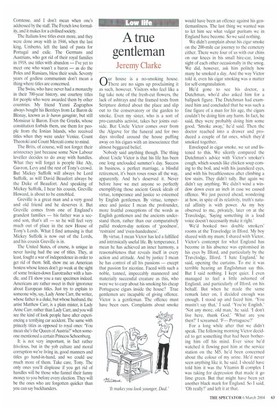A true gentleman
Jeremy Clarke
Our house is a no-smoking house. There are no signs up proclaiming it as such, however. Visitors who feel like a fag take note of the fresh-cut flowers, the lack of ashtrays and the framed texts from Scripture dotted about the place and slip out to the conservatory or the garden to smoke. Even my sister, who is a sort of pro-cannabis activist, takes her joints outside. But Uncle Victor comes over from the Algarve for the funeral and for two days strolled around the house puffing away on his cigars with an insouciance that almost beggared belief.
Nobody said anything though. The thing about Uncle Victor is that his life has been one long unclouded summer's day. Success in business, a perfect marriage, a blissful retirement, it's been roses roses all the way, apparently. And he's deserved it. Never before have we met anyone so perfectly exemplifying those ancient Greek ideals of virtue, temperance and justice so esteemed by English gentlemen. By virtue, temperance and justice I mean the profounder, more fruitful conceptions of the words as English gentlemen and the ancients understand them, rather than our comparatively pallid modern-day notions of 'goodness', 'restraint' and 'even-handedness'.
By virtue. I mean Victor has led a fulfilled and intrinsically useful life. By temperance, I mean he has achieved an inner harmony, a reasonableness that reveals itself in every action and attitude. And by justice I mean he has control of all his passions — except that passion for nicotine. Faced with such a noble, tanned, impeccably mannered and materially successful creature as this, who were we to carp about his smoking his cheap Portuguese cigars inside the house? True gentlemen are incapable of giving offence. Victor is a gentleman. The offence must have been ours. Complaints about smoke would have been an offence against his gentlemanliness. The last thing we wanted was to let him see what vulgar puritans we in England have become. So we said nothing.
We didn't complain about his cigar smoke on the 200-mile car journey to the cemetery either. There were four of us with our chins on our knees in his small hire-car, losing sight of each other occasionally in the smog. We did, however, ask him politely how many he smoked a day. And the way Victor told it, even his cigar smoking was a matter for self-congratulation.
He'd gone to see his doctor, a Dutchman, who'd also asked him for a ballpark figure. The Dutchman had examined him and concluded that he was such a fine figure of a man for his age, the cigars couldn't be doing him any harm. In fact, he said, they were probably doing him some good. `Smoke away,' he'd said. Then the doctor reached into a drawer and produced a couple of fat ones, which they'd smoked together.
Enveloped in cigar smoke, we sat and listened to this. We silently compared the Dutchman's advice with Victor's smoker's cough, which sounds like chicken soup coming to the boil, and with his jaundiced eyes, and with his breathlessness after climbing a few stairs. They didn't tally. But again we didn't say anything. We didn't wind a window down even an inch in case we caused offence. We just peered ahead, wondering at how, in spite of its relativity, truth's natural affinity is with power. As my boy observed to me, privately, later on at the Travelodge, Saying something in a loud voice doesn't necessarily make it right.'
We'd booked two double smokers' rooms at the Travelodge in Ilford. My boy shared with my mum; I shared with Victor, Victor's contempt for what England has become in his absence was epitomised in his eyes by Ilford, and particularly by the Travelodge, Ilford, `I hate England,' he said, opening the curtains, To me it was terrible hearing an Englishman say this. But 1 said nothing. I kept quiet. I even managed to feel a little ashamed of England, and particularly of Ilford, on his behalf. But when he made the same remark later on, I decided enough was enough. I stood up and faced him. 'You mustn't say that,' I said. 'You're English.' 'Not any more, old man,' he said. 'I don't live here, thank God.' What are you then?' I screamed. `F— Portuguese?'
For a long while after that we didn't speak. The following morning Victor decided to get something that had been bothering him off his mind. Ever since he'd watched it flowing past him at the service station on the M5. he'd been concerned about the colour of my urine. He'd never seen anything like it, he said. I should have told him it was the Vitamin B complex I was taking for depression that made it go lime green. But that might have been yet another black mark for England. So I said, 'Oh really?' and left it at that.


















































































 Previous page
Previous page